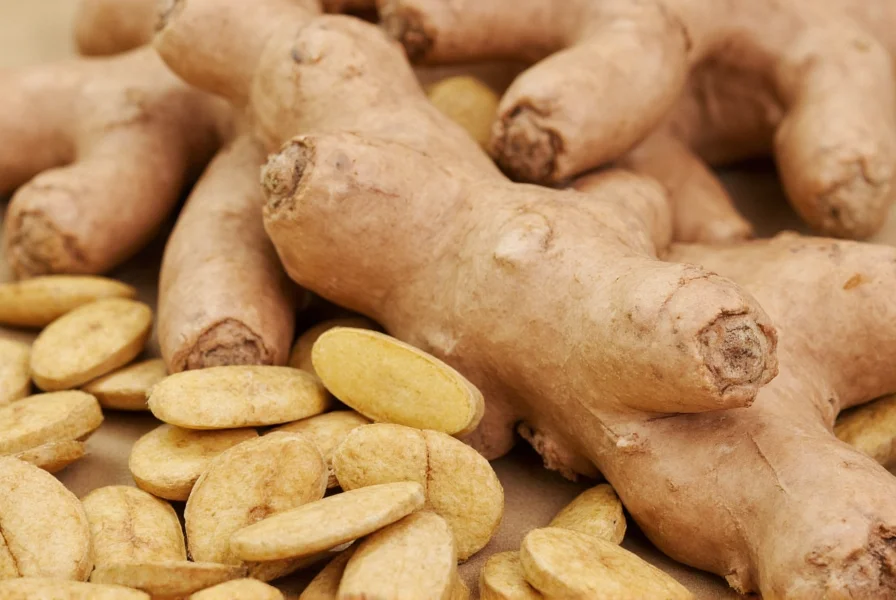Ginger root supplements have gained significant attention in natural health circles for their potential therapeutic benefits. Derived from the Zingiber officinale plant rhizome, these supplements concentrate ginger's active compounds, particularly gingerols and shogaols, which are responsible for many of its physiological effects. Unlike culinary ginger use, supplements provide standardized doses that deliver consistent amounts of these bioactive components.
What Science Says About Ginger Root Benefits
Multiple clinical studies support ginger's effectiveness for specific health concerns. A comprehensive review published in Nutrients (2021) analyzed 50 randomized controlled trials examining ginger supplementation. The research demonstrated ginger's most consistent benefits relate to:
| Health Benefit | Effective Dosage Range | Scientific Support Level |
|---|---|---|
| Morning sickness relief | 1,000-1,500 mg daily | Strong (multiple RCTs) |
| Post-operative nausea | 1,000 mg pre-surgery | Moderate to strong |
| Osteoarthritis pain | 500-1,000 mg daily | Moderate (short-term) |
| Digestive support | 800-1,000 mg before meals | Preliminary evidence |
Researchers believe ginger works through multiple mechanisms, including anti-inflammatory pathways and direct effects on gastrointestinal motility. Unlike pharmaceutical interventions, ginger root supplements typically produce effects gradually without significant side effects for most users.
Different Forms of Ginger Root Supplements
Consumers encounter various ginger supplement formats, each with distinct advantages:
- Standardized extracts (typically 5% gingerols): Provide consistent potency and are ideal for therapeutic use
- Capsules and tablets: Convenient for precise dosing with minimal taste interference
- Fresh ginger powder: Contains full spectrum of compounds but less concentrated
- Liquid tinctures: Allow for flexible dosing and faster absorption
When evaluating ginger root supplements for nausea relief, look for products specifying gingerol content, as this compound directly correlates with antiemetic effects. For ginger root supplements for digestion, combination products with other digestive enzymes may provide enhanced benefits.
Safety Profile and Potential Interactions
Ginger root supplements are generally well-tolerated, but certain precautions apply. The most common ginger root supplements side effects include mild heartburn, mouth irritation, and diarrhea at higher doses. More significant concerns involve potential interactions:
- May enhance effects of blood-thinning medications like warfarin
- Could lower blood sugar levels when combined with diabetes medications
- Might increase bleeding risk during surgical procedures
- Possible interaction with hypertension medications
Individuals with gallstones should exercise caution, as ginger may increase bile production. Pregnant women should consult their healthcare provider before using ginger supplements beyond culinary amounts, despite evidence supporting its use for morning sickness.
Selecting Quality Ginger Root Supplements
Not all products deliver what they promise. When choosing the best ginger root supplement, consider these factors:
- Standardization: Look for products specifying gingerol content (usually 4-5%)
- Third-party testing: Certifications from USP, NSF, or ConsumerLab indicate quality verification
- Extraction method: Supercritical CO2 extraction preserves more active compounds
- Additives: Avoid unnecessary fillers, especially for those with sensitivities
- Expiration date: Ginger compounds degrade over time, affecting potency
The best ginger root supplement dosage depends on your specific health goals. For general wellness, 250-500 mg daily may suffice. For targeted support like nausea management, research suggests 1,000-1,500 mg divided into multiple doses provides optimal results. Always start with lower doses to assess tolerance before increasing.
Realistic Expectations for Ginger Root Supplements
While promising, ginger supplements aren't miracle cures. The scientific evidence for ginger supplements shows modest but meaningful effects for specific conditions. Most studies demonstrate benefits emerging after consistent use for 2-4 weeks, not immediately. Ginger works best as part of a comprehensive approach to health rather than a standalone solution.
Current research has limitations - many studies use small sample sizes and short durations. More long-term research is needed to fully understand ginger's therapeutic potential and optimal usage protocols. However, the existing evidence combined with centuries of traditional use provides a solid foundation for considering ginger root supplements as part of a wellness regimen.
Frequently Asked Questions
How long does it take for ginger root supplements to work for nausea?
For acute nausea like morning sickness or motion sickness, effects may be noticeable within 30-60 minutes. For chronic conditions like chemotherapy-induced nausea, consistent daily use for 1-2 weeks typically yields best results. Research suggests taking 1,000 mg about 30 minutes before potential nausea triggers provides optimal prevention.
Can I take ginger root supplements every day?
Yes, daily use of ginger root supplements is generally safe for most adults at recommended doses (up to 2,000 mg daily). Long-term studies show good tolerance for up to 6 months of continuous use. However, if using daily for extended periods beyond 3-4 months, consult your healthcare provider to monitor for potential interactions or side effects.
What's the difference between fresh ginger and ginger root supplements?
Fresh ginger contains about 0.5-3% gingerols by weight, while standardized supplements typically concentrate these compounds to 4-5%. This means you'd need to consume approximately 10 grams of fresh ginger to equal the active compounds in a 500 mg standardized supplement. Supplements provide consistent dosing without the strong taste, but lack some of the additional compounds found in whole ginger.
Are ginger root supplements safe for people with high blood pressure?
Ginger may have mild blood pressure-lowering effects, so those with hypotension or taking blood pressure medications should use caution. Current evidence suggests moderate ginger consumption (up to 2,000 mg daily) is generally safe for most hypertension patients, but monitoring is recommended. Always consult your physician before adding supplements to your regimen if you have cardiovascular conditions.











 浙公网安备
33010002000092号
浙公网安备
33010002000092号 浙B2-20120091-4
浙B2-20120091-4